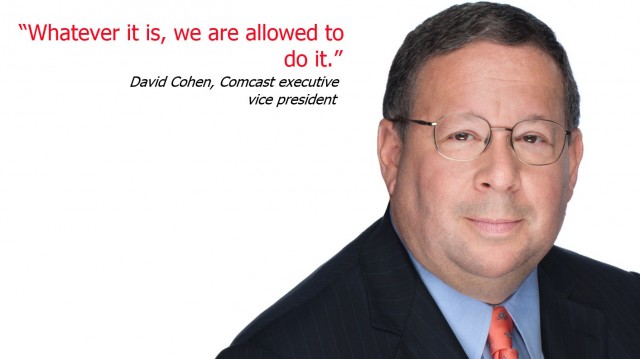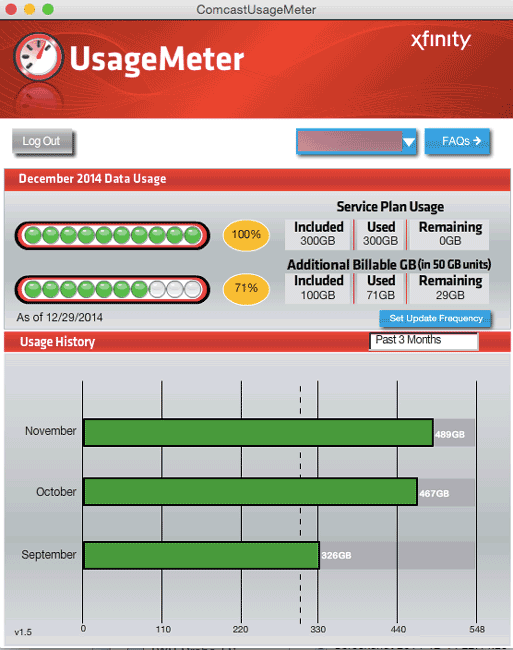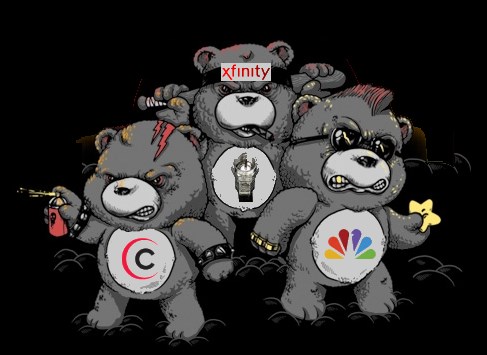What makes 300GB so special? It happens to represent the monthly usage allowance Comcast customers in several southern and western service areas receive after more than two years of “Data Usage Plan Trials.”
One of most asked questions posed to Comcast is why one of the nation’s largest and most profitable Internet Service Providers needs to impose usage caps at all, especially as the company has repeatedly raised broadband speeds for customers.
It took a parody Twitter account known as “Cable Cares” to get a cogent answer from Comcast’s vice president of Internet services, Jason Livingood: he doesn’t know.

Livingood admitted Comcast’s “data usage plans” a/k/a “usage caps” are a “business policy” far removed from his work as a Comcast engineer helping to keep Comcast’s broadband service up and running efficiently.
 Stop the Cap! never doubted it for a moment.
Stop the Cap! never doubted it for a moment.
Internet Service Providers have often claimed usage caps are a matter of “fairness” — first to control congestion on their broadband networks and later as a way to pay for needed upgrades. But neither has proved true.
Starting in 2008, Comcast imposed a 250GB usage cap on its broadband service and issued warnings to customers that rampaged past it, threatening to cut their service off if they did not curtail usage. Those contacted were told their heavy use could impact broadband service for other customers who used it much less.
Internet providers told the Government Accountability Office another story entirely, admitting congestion is not a problem for cable operators or phone companies at all.
“Some wireless ISPs told us they use usage based pricing to manage congestion,” the GAO reported in June 2014. But “wireline ISPs said that congestion is not currently a problem.”
As upgrades have exponentially increased network capacity, the story told to defend usage caps changed dramatically. The new claim is that usage-based pricing and caps can “generate more revenue for ISPs to fund network capacity upgrades as data use grows,” the GAO reported.
Except as the New York Times reported last year, the United States is hardly a broadband speed leader and the quality of service “has nothing to do with technology. Instead, it is an economic policy problem — the lack of competition in the broadband industry.”

Usage caps for one and all.
For now, Comcast isn’t commenting at all about the reasons for its usage cap trials. But a few years ago, Comcast VP David Cohen believed caps would be rolled out across Comcast’s entire nationwide service area anyway.
Comcast executives have repeatedly told investors customers had accepted the usage cap trials and few have exceeded their usage allowances. But judging from Comcast’s customer support forums, the issue of usage caps and measurement rises near the top of complaints.
Comcast’s unregulated usage meter is a frequent target. What it registers is what Comcast uses to bill its customers.
“I have the ability to track my inbound and outbound data usage at my router. Nothing in my house can talk to the Internet (the cable modem) without going through the router,” one customer wrote on Comcast’s support forum. “The traffic meter on the router is significantly less than the Xfinity Usage Meter. As of right now, my router says my inbound/outbound usage since 7/1/2015 is 67.34GB, but the Xfinity Usage Meter says I am at 114GB.”
 “At Comcast, the meter is right and the customer is wrong,” complains another customer.
“At Comcast, the meter is right and the customer is wrong,” complains another customer.
“I am sick of calling customer service and being told that the Xfinity usage meter is right, but that there is absolutely no data that can be given to me to support that answer. This is beyond ridiculous and I am beyond frustrated. I have no options for recourse and am just supposed to accept that I am flying blind.”
Flying blind can be costly. One Comcast customer opened his broadband bill to discover $260 in charges conveniently automatically removed from his checking account after Comcast claimed he used almost 2TB of usage in a month.
“My wife and I browse emails, browse the Internet with Facebook and sometimes watch Youtube,” the customer wrote. “We don’t even have Netflix or any other streaming service here at the house.”
The customer complains Comcast refuses to refund or document the 2TB of usage. As long as Comcast “verifies” a customer’s modem handled that traffic, the customer is billed without recourse.
But customers do have some recourse: complaining to the Federal Communications Commission or the Better Business Bureau.
“I have seen other posts from customers with similar issues,” a Comcast customer noted. “It seems that they get help once they threaten to go to the FCC or the BBB.”
The FCC’s online complaint form often results in substantial billing credits and charge reversals for shocking cable bills. The FCC is gradually turning its attention to the issue of usage caps, perhaps proportionate to the number of consumer complaints about the issue.
The Better Business Bureau helps put customers in touch with executive level customer service agents empowered well beyond the usual offshore customer service center employees. It appears they did exactly that 35,281 times in the last three years — 14,052 in the last year alone. Most of those complaints were evidently resolved to the customer’s satisfaction.
 Comcast plans to upgrade its cable broadband facilities nationwide to support gigabit broadband using DOCSIS 3.1 technology within two years, according to a company official.
Comcast plans to upgrade its cable broadband facilities nationwide to support gigabit broadband using DOCSIS 3.1 technology within two years, according to a company official.

 Subscribe
Subscribe


 Krystal Wright has two major stresses in her life now: worrying about a disabled parent who has lost the ability to access 911 and Comcast, the company that made not having access to 911 possible.
Krystal Wright has two major stresses in her life now: worrying about a disabled parent who has lost the ability to access 911 and Comcast, the company that made not having access to 911 possible.

 “At Comcast, the meter is right and the customer is wrong,” complains another customer.
“At Comcast, the meter is right and the customer is wrong,” complains another customer.
